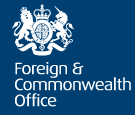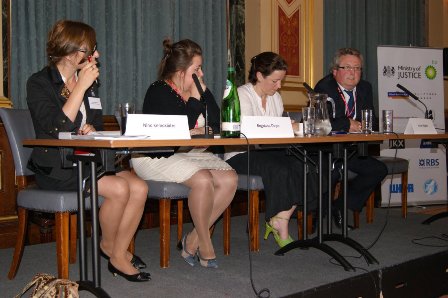The Minority Governance Impasse, ECMI Advisory Council Conference 2012, 7 May, Berlin, Germany
Vertretung des Landes Schleswig-Holstein beim
Bund
In den Ministergärten 8, 10117 Berlin
As chairman of the Advisory Board for 2012 my presentation - "A critical research perspective" - provided the introduction to the academic discussion. For the programme and event see: http://www.ecmi.de/events/ecmi-advisory-council-conference-2012/
Conference: Prospects and Opportunities for Conflict Resolution in the Post-Soviet Space
"Prospects and Opportunities for Conflict Resolution in the Post-Soviet Space"
4 July 2011, Locarno Suite, Foreign and Commonwealth Office, London, UK
 Co-organised with the UK Foreign and Commonwealth Office, and sponsored by the Department of Political Science and International Studies, the School of Government and Society and the Centre for Russian and East European Studies at the University of Birmingham, as well as the John Smith Memorial Trust, the University Association for Contemporary European Studies, the School of Slavonic and East European Studies at University College London, the Centre for East European Language Based Area Studies and the Specialist Group Ethnopolitics of the Political Studies Association of the UK, this conference takes stock of two decades of conflict and conflict management in the former Soviet Union, assessing the state of play in Moldova and the North and South Caucasus, and the prospects of international efforts to bring sustainable peace to conflicts in the region.
Co-organised with the UK Foreign and Commonwealth Office, and sponsored by the Department of Political Science and International Studies, the School of Government and Society and the Centre for Russian and East European Studies at the University of Birmingham, as well as the John Smith Memorial Trust, the University Association for Contemporary European Studies, the School of Slavonic and East European Studies at University College London, the Centre for East European Language Based Area Studies and the Specialist Group Ethnopolitics of the Political Studies Association of the UK, this conference takes stock of two decades of conflict and conflict management in the former Soviet Union, assessing the state of play in Moldova and the North and South Caucasus, and the prospects of international efforts to bring sustainable peace to conflicts in the region.
In my presentation I argued that the frozen conflicts of the post-Soviet space look set to remain, because the proposed solutions to such conflicts – in the form of various types of autonomy arrangements – are likely to be as destabilising as the conflicts themselves. With the concomitant rise of nationalism and democracy, the internal causes of conflict, such as the deinstitutionalisation of arrangements that had previously accommodated minorities, prevent sustainable solutions along traditional lines of minority accommodation as advocated by the international community. It is now necessary to reconceptualise frozen conflicts and to stop viewing the status quo as dysfunctional. We should accept that there are some positive aspects of the status quo and lower our expectations of what can be achieved in some cases. Conflict resolution might not always be possible and de facto states might be seen to represent a new hybrid form in the international system. I concluded by emphasising the need for a focus on the on-the-ground issues in frozen conflicts, such as economic development and the need for rebuilding trust among the protagonists at all levels.
Conference Programme and Report

Speaking at the FCO conference on “Frozen Conflicts”, 4 July 2011, used with permission of University of Birmingham

 The workshop focused on the reconstruction of national identities in European societies after civil war. While country-specific studies, and those of reconstruction projects after international wars, exist, how European societies have reconstructed their national identities after civil conflict has not been studied in a comparative way. Civil wars invariably result in changes to the territorial bases of states, population movements, the collapse of old systems of rule, and disputes concerning the nature of legitimate authority, all of which touch on questions of national identity. Unlike international wars, combatants have to learnt to co-exist after civil wars. Yet unlike international wars, civil wars split identity, so the question of how a ‘post conflict’ identity can be based on a civil war division is a complex one. The workshop was led by Dr Bill Kissane, LSE, and the papers are currently being revised for publication.
The workshop focused on the reconstruction of national identities in European societies after civil war. While country-specific studies, and those of reconstruction projects after international wars, exist, how European societies have reconstructed their national identities after civil conflict has not been studied in a comparative way. Civil wars invariably result in changes to the territorial bases of states, population movements, the collapse of old systems of rule, and disputes concerning the nature of legitimate authority, all of which touch on questions of national identity. Unlike international wars, combatants have to learnt to co-exist after civil wars. Yet unlike international wars, civil wars split identity, so the question of how a ‘post conflict’ identity can be based on a civil war division is a complex one. The workshop was led by Dr Bill Kissane, LSE, and the papers are currently being revised for publication. Common sense suggests that in times of war human beings are likely to close ranks and become more nationalistic. The presence of actual or perceived threat is often seen as having a direct impact on existing social relationships with the escalation of violence polarising groups involved in the conflict. The general assumption is that warfare inevitably fosters the emergence of strong national identities that also entail a lack of solidarity towards those who find themselves on the other side of the conflict line. However such a view clearly forgets that both nationalism and war are highly dynamic and unpredictable forces. There were many historical instances when impending warfare had little impact on the intensity of nationalist feelings; equally the historical record is full of examples of warfare weakening nationalist sentiments, with nationalism at times reinforcing antimilitarism.
Common sense suggests that in times of war human beings are likely to close ranks and become more nationalistic. The presence of actual or perceived threat is often seen as having a direct impact on existing social relationships with the escalation of violence polarising groups involved in the conflict. The general assumption is that warfare inevitably fosters the emergence of strong national identities that also entail a lack of solidarity towards those who find themselves on the other side of the conflict line. However such a view clearly forgets that both nationalism and war are highly dynamic and unpredictable forces. There were many historical instances when impending warfare had little impact on the intensity of nationalist feelings; equally the historical record is full of examples of warfare weakening nationalist sentiments, with nationalism at times reinforcing antimilitarism.